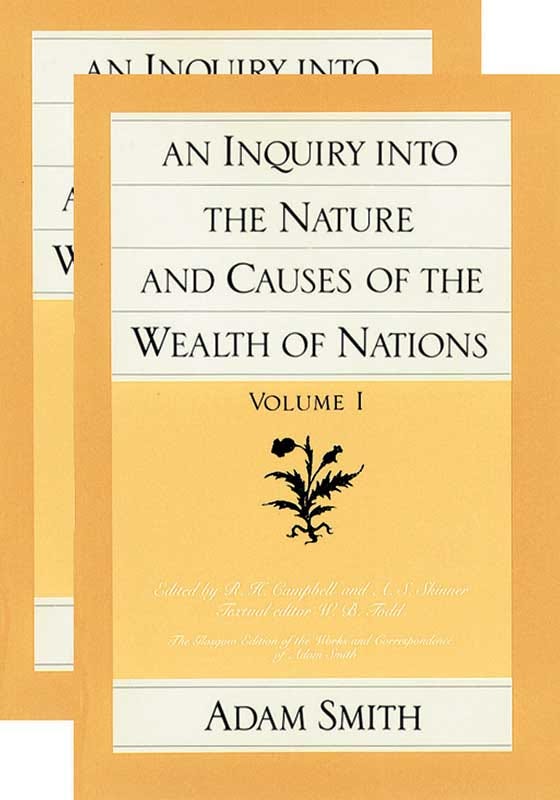High wages in the American Colonies
Reading The Wealth of Nations
I am reading through The Wealth of Nations and will be posting a short sequence of blogs about it. (Though I confess that I skipped the silver digression, for now at least…) As well as looking at Smith’s prose style and examples of his ideas found in novels, I’ll post some extracts, such as this one, which claims that wages in the North American colonies were higher than in England, despite the fact that England was a richer country. Of course, wages declined disastrously after the Revolutionary War, but Smith was writing before that.
It is not the actual greatness of national wealth, but its continual increase, which occasions a rise in the wages of labour. It is not, accordingly, in the richest countries, but in the most thriving, or in those which are growing rich the fastest, that the wages of labour are highest. England is certainly, in the present times, a much richer country than any part of North America. The wages of labour, however, are much higher in North America than in any part of England. In the province of New York, common labourers earned in 1773, before the commencement of the late disturbances, three shillings and sixpence currency, equal to two shillings sterling, a-day; ship-carpenters, ten shillings and sixpence currency, with a pint of rum, worth sixpence sterling, equal in all to six shillings and sixpence sterling; house-carpenters and bricklayers, eight shillings currency, equal to four shillings and sixpence sterling; journeymen tailors, five shillings currency, equal to about two shillings and tenpence sterling. These prices are all above the London price; and wages are said to be as high in the other colonies as in New York. The price of provisions is everywhere in North America much lower than in England. A dearth has never been known there. In the worst seasons they have always had a sufficiency for themselves, though less for exportation. If the money price of labour, therefore, be higher than it is anywhere in the mother-country, its real price, the real command of the necessaries and conveniencies of life which it conveys to the labourer, must be higher in a still greater proportion.
Smith goes on to claim that the “most decisive mark” of prosperity is population growth. Whereas population in England doubles in five hundred years, in the colonies it doubles in twenty-five. No wonder they marry young, Smith says, when it is so valuable to have children who become workers.
But though North America is not yet so rich as England, it is much more thriving, and advancing with much greater rapidity to the further acquisition of riches. The most decisive mark of the prosperity of any country is the increase of the number of its inhabitants. In Great Britain, and most other European countries, they are not supposed to double in less than five hundred years. In the British colonies in North America, it has been found that they double in twenty or five-and-twenty years. Nor in the present times is this increase principally owing to the continual importation of new inhabitants, but to the great multiplication of the species. Those who live to old age, it is said, frequently see there from fifty to a hundred, and sometimes many more, descendants from their own body. Labour is there so well rewarded, that a numerous family of children, instead of being a burden, is a source of opulence and prosperity to the parents. The labour of each child, before it can leave their house, is computed to be worth a hundred pounds clear gain to them. A young widow with four or five young children, who, among the middling or inferior ranks of people in Europe, would have so little chance for a second husband, is there frequently courted as a sort of fortune. The value of children is the greatest of all encouragements to marriage. We cannot, therefore, wonder that the people in North America should generally marry very young.
More recent work seems to support Smith. Per capita income was higher in the colonies and they were more economically equal. Of course, in one major, fundamental way, there was gross inequality in the colonies. But even taking enslaved people into account, the colonies had a lower Gini than England.
I admire the writing in this passage. Smith is always an easy writer to follow, who learned the plain style from Swift. He is vivid and relies on clear images, without distorting his ideas. Once you adjust for some of the changes in the way we use vocabulary today (“occasions a rise”; “We cannot, therefore, wonder”; “the further acquisition of riches”) Smith’s prose is plain enough to be published in a modern magazine. He balances generalisations with examples, explains himself in quotidian terms, gives lots of numbers to back up his claims, and uses colloquial instances to bring his scene to life. He also uses helpful repetitions: the phrase “necessaries and conveniencies” occurs at the start and is a sort of shorthand throughout.
Despite Smith’s vivacity, this is a melancholy passage to read in these days of declining fertility.
I am reading the two volume Liberty Fund edition which I found in Capitol Hill Books. You can read The Wealth of Nations online here.



Dude, Liberty Fund is a gold mine.
I love Liberty Fund books